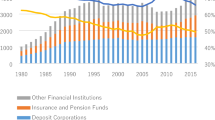Abstract
This contribution focuses on the consequences of the natural disaster in Japan for the world financial markets as seen around half a year after the nuclear accident happened. It, thus, focuses on expectations about what would happen in macroeconomics terms later on. For this purpose, it examines how deep the slump in growth was, to what extent Japanese suppliers are integrated into international production chains, and how much the world economy would, thus, be affected. Moreover, it assesses what the economic implications of a forced withdrawal from nuclear energy as a reaction to the disaster would have been. Finally, it elaborates on the consequences of the natural disaster in Japan for the world financial markets and for the development of national debt.








Similar content being viewed by others
Notes
For an explanation see https://cbcm.commerzbank.com/de/site/research/economic_research/.
References
Bank von Japan (2011) International Investment Report, Tokyo
Belke A (2009) Fiscal stimulus packages and uncertainty in times of crisis—the option of waiting can be valuable, though! Econ Anal Policy 39(1):25–46
Belke A (2011) Naturkatastrophe in Japan: Verwerfungen auf den Weltfinanzmärkten? DIW-Wochenbericht 78(24):20
Braun RA, Ikeda D, Joines DH (2009) The savings rate in Japan. Why it has fallen and why it will remain low. Int Econ Rev 50:291–321
Cavallo E, Noy I (2010) The economics of natural disasters - A survey, IDB Working Paper 124, Inter-American Development Bank, May
Chen K, Imrohoroglu A, Imrohoroglu S (2006) The Japanese savings rate. Am Econ Rev 96:1850–1858
Chen K, Imrohoroglu A, Imrohoroglu S (2007) The Japanese savings rate between 1960 and 2000. Productivity, policy changes, and demographics. Econ Theory 32:87–104
Commerzbank (2011) Research Note - ARPI2-Rückgang bei Stabilisierung in Japan begrenzt, Economic Research, Frankfurt/Main
DIW (2011) Reader zum Workshop „Konsequenzen der Naturkatastrophe in Japan für die Weltwirtschaft“, June 1, BMWI Workshop at the „Bundesministerium für Wirtschaft und Technologie“, German Institute for Economic Research, Berlin
Edison H (2005) Household savings in Japan, in: IMF Country Report 05/272: Japan- Selected issues
European Central Bank (2011a) Global repercussions of the earthquake in Japan. Monthly Bulletin, Frankfurt, pp 10–12
European Central Bank (2011b) Economic and monetary developments, Monthly Bulletin, Frankfurt/Main, September
Farhi E, Gabaix X (2008) Rare disasters and exchange rates, NBER Working Paper, National Bureau of Economic Research, Cambridge/MA, February
Fomby T, Ikeda Y, Loayza N (2009) The growth aftermath of natural disasters, The World Bank, Policy Research Working Paper 5002, Washington/DC
Fukawa T, Sato I (2009) Projection of pension, health, and long-term care expenditures in Japan through macro simulation. Japan J Soc Secur Policy 8:33–42
Gassebner M, Keck A, The R (2010) Shaken, not stirred: the impact of disasters on international trade. Rev Int Econ 18:351–368
Horioka C (2006) The dissaving of the aged revisited: The case of Japan, NBER Working Paper 12351, National Bureau of Economic Research, Cambridge/MA
Horwich G (2000) Economic lessons of the Kobe earthquake. Econ Dev Cult Chang 48(3):521–542
Masumiya M (2011) Impact of the Great Eastern Japan disaster on the property market, NLI Research Institute, Real Estate Analysis Report, 22. April
Ministry of Economy, Trade and Industry (2011) Economic impact of the Great East Japan earthquake and current status of recovery, http://www.meti.go.jp/english/earthquake/recovery/pdf/20110516_impact.pdf
Mizuho (2011) Economic outlook for FY 2010, FY 2011 and FY 2012, revised after the great east Japan earthquake, 8. April 2011, http://www.mizuho-ri.co.jp/research/economics/pdf/eo/EconomicOutlook1104r.pdf
Pelling M, Özerdem A, Barakat S (2002) The macro-economic impact of disasters. Prog Dev Stud 2(4):283–305
Rees A (2011) Die Aufwertung des Yen ist ein großes Risiko, in: Boersenzeitung, March 15, No. 51, S. 6
Skidmore M, Toya H (2002) Do natural disasters long-term growth? Econ Inq 40(4):664–687
Skidmore M, Toya H (2006) Economic development and the impacts of natural disasters. Econ Lett 94:20–24
The Economist (2011) Japan’s post-quake economy: casting about for a future. Issue May 19, 2011. Available online
UniCredit (2011a) Transmissionskanäle einer möglichen Katastrophe, March 15, Economics & FI/FX Research, Im Brennpunkt, Munich
UniCredit (2011b) Risiken für die Weltwirtschaft nehmen weiter zu, March 18, Economics & FI/FX Research, Freitagspapier, Munich
UniCredit (2011c) Japan bremst globale Industriekonjunktur, April 1, Economics & FI/FX Research, Freitagspapier, Munich
UniCredit (2011d) Griechenland dominiert EZB-Treffen, April 30, Economics & FI/FX Research, Freitagspapier, Munich
World Bank (2011) The recent earthquake and tsunami in Japan: implications for East Asia, East Asia Economic and Pacific Update No. 1
Author information
Authors and Affiliations
Corresponding author
Rights and permissions
About this article
Cite this article
Belke, A. Natural disaster in Japan: implications for world financial markets. Asia Eur J 11, 433–444 (2013). https://doi.org/10.1007/s10308-013-0362-6
Received:
Accepted:
Published:
Issue Date:
DOI: https://doi.org/10.1007/s10308-013-0362-6




